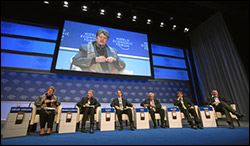Outsourcing Irrigation, Farming Discontent
World Economic Forum Report Warns Water Scarcity May Breed New Form of Colonization, Urges Trade Reforms
 Madagascar, blessed with an abundance of fresh water and other natural resources, may hold the key to solving global water shortages, but at what price for the developing nation?
Madagascar, blessed with an abundance of fresh water and other natural resources, may hold the key to solving global water shortages, but at what price for the developing nation?by Sarah Haughn
Circle of Blue
As February wanes, riots rock the streets in Madagascar. The Malagasy people are not happy with their government, who just a few months ago announced a deal to lease half of the nation’s arable land to private investors from South Korea. The Daewoo Logistics Corporation seeks to cultivate 1.3 million hectares of palm oil and maize for export back to South Korea, federal authorities say.
Why? The answer: water. The peninsular nation boasts a burgeoning population as well as insufficient access to water for irrigation. According to the United Nations, South Korea depends on foreign countries to feed its populous. Civil society policy experts estimate that, excluding rice, the nation imports 95 percent of its food. Its government has focused domestic land use toward developing industry. They are not the only government to do so.
From fields to financing firms, the way people do business with the planet is changing. Whether the change is for better or worse remains uncertain. As leaders from governments, businesses and civil society begin to grapple with the threats of a global water crisis, the annual gatherings of the World Economic Forum (WEF) take on a new message: what can we do about water?
The recently published World Economic Forum’s Water Initiative report – The Bubble is Close to Bursting: A Forecast of the Main Economic and Geopolitical Water Issues Likely to Arise in the World during the Next Two Decades – delivers a potent answer.
“Governments in water-scarce regions will be in a weaker position if they choose not to engage in water management reforms,” the report declares. “If no reform actions are taken … water scarcity will have a profound effect on global and regional systems whether from an economic growth, human security, environmental or geopolitical stability perspective.”
The newest oldest approach to resource management
Familiar trends are emerging from unfamiliar problems. At WEF in Davos this January, experts expressed concern that scarcity of water domestically is encouraging renewed interest in land abroad – an interest some claim is tantamount to colonization.
In its 2009 Water Report, the WEF Water Initiative cautions that “if forecasts for future water demand are accurate, and reforms to trade do not occur, rapidly industrializing economies across South Asia, the Middle East and North Africa, supporting approximately 2.5 billion people, will be looking elsewhere to acquire water-rich land for their food.”
Importing water in the form of food crops means less stress on dwindling supplies. It means the status quo of water use can persist undisturbed – an attractive alternative that water-scarce countries like South Korea, Saudi Arabia and China are already pursuing.
With the outdated infrastructure and tangled bureaucracy prevalent in water management systems worldwide, outsourcing irrigation provides thirsty nations with strong economies an escape from ever-worsening problems at home.
Water speculators turn to the developing world
Daewoo’s speculative struggle for land and water in Madagascar is not without its setbacks. The company’s proposal to the former French colony sounds familiar. Although its government extols the many benefits foreign investment promises to bring, its populous remains skeptical.
“The Daewoo deal has really got people up in arms because land is a sacred thing in Madagascar and giving away such a large territory was perceived as a sort of national treason,” Malagasy analyst Jean-Eric Rakotoharisoa told South Africa’s MoneyBiz.
Madagascar claimed its independence less than 50 years ago. Much like South Korea, the nation suffers from chronic food insecurity. Only half the island nation is arable, but a lack of infrastructure coupled with disastrous cyclones, floods and droughts prevent Malagasies from cultivating more than a tenth of that land. Its population remains hungry, with most people surviving on less than a dollar a day.
According to the Pacific Institute’s World’s Water report, Madagascar currently receives an average of $9.47 million annually in overseas development assistance. That is more than 60 times the aid that South Korea receives. And, while the island nation boasts five percent of the world’s biodiversity and offers a wealth of renewable fresh water – 337 km3/yr to South Korea’s 69.7 km3/yr – it remains one of the world’s top 30 poorest countries.
With less wealth and more water than South Korea, could investment from foreign corporations such as Daewoo wean Madagascar off its dependence on aid? The deal, the corporation emphasizes, would bring 70,000 new jobs to the island and also assist in developing much-needed internal infrastructure. This too, could drive in more foreign investment and raise employment rates significantly.
Aware of their nation’s poverty as well as its promise, Malagasies remain unconvinced that Daewoo’s proposed 99-year lease and concurrent pledge to invest in infrastructure and jobs will improve the nation’s economy. As public dissent in Madagascar intensifies and the central government becomes increasingly unstable, Daewoo is starting to back down. Indeed, the corporation is threatening to pull out altogether, if the situation does not improve.
“It may be a bit of a dangerous investment,” Shin Dong-hyun, a Daewoo Logistics official, said to South Korea’s JoongAng Daily. “We hope the situation will get better in the near future.”
Daewoo denies that their proposed lease is in any way tied to Madagascar’s current unrest. The corporation blames foreign media – such as the BBC and The New York Times – for the negative spin. Its interests, Daewoo maintains, have nothing to do with food security in South Korea, or the desire to grab land in Madagascar.
But without public support, and in the face of a wobbling government, Daewoo is slowing down its bid for agricultural development.
Madagascar’s deposed mayor of Antananarivo, a prominent face for the nation’s current political tension, reassured reporters that “Daewoo is one of the reasons for the people’s anger. I condemn the signatories, notably the president and the government. Our customs do not allow for land to be sold or leased to foreigners.”
Trade-offs: water-sensitive exchange is key to sustainable futures
As South Korea’s private sector seeks answers in Africa, the country’s leadership is touring the countryside to spread the word that a water crisis could occur as soon as 2015. According to the Korea Times, President Lee Myung-bak urged industry and farmers in drought-prone Gangwon Province to start thinking green. “Korea is not prepared at all for a water shortage. The problem is not shared among ordinary people. It is urgent to raise public awareness about it,” he said.
“The global economic downturn is expected to continue this year,” noted Lee, “forcing firms to reduce exports and creating additional downside risks for South Korea, which is heavily dependent on trade for economic growth.”
Trade, according to the WEF Water Report, is one of the very elements of the economy that must be reworked – especially concerning water. Currently, the report indicates, little correlation exists between agriculture and water supply: three of the top exporters of food face water-scarcity; three of the top importers possess plenty of water.
Unless trade around agriculture increases in scale with water available for irrigation, the globalized economy could easily revert to 19th century unilateral and bilateral agreements as well as exploitative overseas land grabs. Peace and fair trade for traditionally poor rural areas such as Africa remain critical starting points, the report concludes.
According to Han Young Me, Chief of Policy for South Korea’s Korean Women Peasants Association, the interest water-scarce nations show in foreign land can be difficult for their own struggling farmers to understand.
“Even this year, 2008, our food self-sufficiency rate went down,” Young Me said in an interview with GRAIN. “But if you went out to the farms, you would see that farmers stopped harvesting and left produce rotting in the field because they could not make ends meet and failed to find a market to sell to.”
Sarah Haughn is a reporter and writer for Circle of Blue, the online independent news organization covering the global freshwater crisis. Reach her at circleofblue.org/contact.








Leave a Reply
Want to join the discussion?Feel free to contribute!